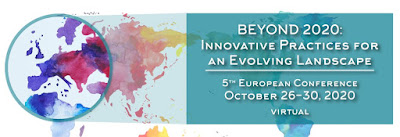I'm a big fan of Educational Credential Evaluators or ECE as many in the field may refer to them since I began working in the field in 2000. To be sure, they are based in Milwaukee so I'm a little biased but the impact that ECE has had on the field cannot be overlooked. I'm also friends with some really good people who currently work or previously worked at ECE and they also add to my admiration for the company!
ECE is celebrating 40 years and they created a fun webpage dedicated to this milestone anniversary and to their founder James Frey (see below for a snippet of a chapter I wrote about the influence that James had on study abroad in the late 1970s). I visited ECE several years ago and was amazed at the library they have built. It was truly impressive and a few off their duplicate materials are now part of my Bury Book International Education Library & Archive!
I'm a huge fan of James Frey and the influence he has had on international education and what he has built at ECE! As a side note, in my co-authored chapter "Qualitative Standards and Learning Outcomes for Study Abroad" in A History of U.S. Study Abroad: 1965-Present edited by William Hoffa and Stephen DePaul, I included James' work and task force leadership into my chapter. Following is that part of my chapter:
Since the matter of program quality and the award of academic credit for overseas study was of great concern to campus registrars, in 1977 NAFSA opened a dialog with the American Association of Collegiate Registrars and Admissions Officers (AACRAO) by setting up the joint AACRAO-NAFSA Task Force on Study Abroad (ANTFOSA). ANTFOSA was established to focus specifically on the problems of study abroad program evaluation. In 1979, ANTFOSA published Study Abroad Programs: An Evaluation Guide through NAFSA. This Evaluation Guide was originally developed by James Frey (Chair of ANTFOSA) from his doctoral dissertation; then it was refined and tested by ANTFOSA, with assistance from the Associate Directorate for Educational and Cultural Affairs of the International Communication Agency through the NAFSA Field Service Program. The Evaluation Guide is based upon a “systemic analysis of the major components of study abroad programs by use of carefully phased questions about each component” (ANTFOSA). The major components for evaluation were grouped under the following headings:
1. Basic information
2. Academic aspects
3. Interaction with the host culture
4. Administrative aspects
For this Evaluation Guide, ANTFOSA requested, as a means to refine the guide, copies of any reports that were produced from using the guide. ANTFOSA also solicited other observations and/or suggestions that users of the guide wanted to make. Conversations within AACRAO have continued annually, usually taking place at the AACRAO national conference.
*Frey, J.S. (1976). "The Development of a Criterion Instrument for Evaluating Agency-Sponsored Study Abroad Programs". Doctoral Dissertation, Indiana University.
